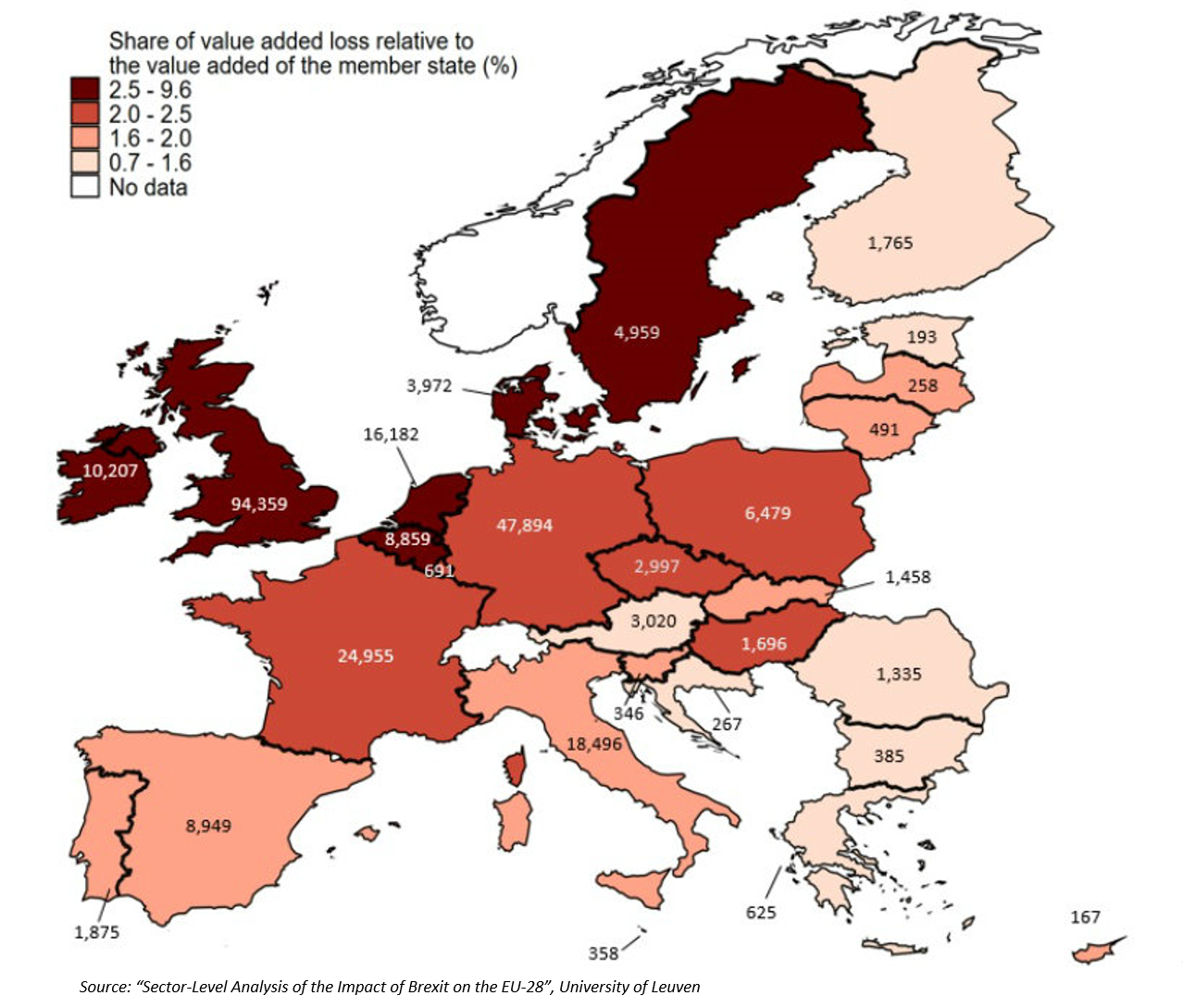
(Free Images, CC BY 2.0)
On Sunday, 18 August, “The Sunday Times” — the Sunday edition of the conservative journal “The Times” — published a government dossier on the Yellowhammer Operation, which describes the actions that the British government will have to take if it leaves the European Union without a deal. The document is confidential, but members of Boris Johnson’s government confirmed its authenticity. Michael Gove, minister responsible for coordinating the plans in the case of a no-deal Brexit, said the report presents the “worst case scenario”.
The document foresees significant delays in the movement of vehicles in the tunnel connecting the United Kingdom with France and ferries carrying trucks between Dover and Calais. From 50 per cent to 85 per cent of trucks using the ferries are not prepared for customs clearance in Calais. Delays could reach up to 2.5 days, which means that some of the food and medicine transported from the continent will expire. This situation will last up to three months, after which the traffic will gradually increase, but will not reach the level before Brexit. 56 per cent of British exports are directed to the continent, so delays in transport, as well as imposed customs duties, will have serious effects on the British economy.
Three quarters of medicines used in the United Kingdom originate from Europe. In the absence of a deal with the EU, in the first days imports of medicines will decrease by 40 per cent and significant supply disruptions will last up to six months.
The United Kingdom will also be hit by fuel shortages, and the overall effect will be an increase in inflation. The report acknowledges that plans to avoid the hard border between Northern Ireland and the Republic of Ireland will “probably prove unrealistic” and new negotiations will be have to be held within a few weeks. There will also be difficulties on the border between Spain and Gibraltar, which will impede tourist traffic. What’s more, at present the border is crossed every day by 15,000 employees living in Spain, but employed in the British enclave. The border check will take approximately 4 hours and this situation will last for at least several months.
The report also warns of the risk of chaos and mass protests in the United Kingdom. Job losses may result in protests and roadblocks, and price increases are likely to boost the grey economy.
The government’s document only presents problems that will arise in the first days after a no-deal Brexit. Not all can be predicted. For example, 40,000 drivers in the European Union, mainly in Ireland, have British driving licenses. In the absence of a deal between Great Britain and the Union, they will lose their validity.
Some problems can be gradually solved, but new ones will come up and persist for a long time, including in particular the labor shortage.
Temporary customs tariffs
The British government published details of the provisional British customs tariff system in March in the event of a hard Brexit. It also assured that it would closely monitor the impact of these customs duties on the UK economy, trying to minimize the damage done to the economy. This temporary situation will last for 12 months.
According to the temporary tariff system, 87 per cent of total imports into the United Kingdom will not be subject to duties. This applies to imports from all countries. In the case of a no-deal Brexit, EU countries will be treated like the rest of the world. Customs duties will be imposed on the remaining 13 per cent of imported goods , and some of them will be subject to import quotas. This will apply to beef, lamb, pork, poultry and dairy products. High customs duties are already in place in the Union to protect EU agricultural producers. The United Kingdom decided to keep them temporarily so as not to weaken the status of their own farmers. Tariffs for certain ceramics, fertilizers and bioethanol will be maintained. Customs duties on agri-food products imported from developing countries will be reduced, including bananas, raw cane sugar and some types of fish.
Customs duties will be imposed on imported cars, but car manufacturers importing car parts from the EU would not have to pay additional tariffs. Temporary tariffs will not apply to goods exported from the Republic of Ireland to Northern Ireland. However, a long-term solution is difficult to find, since tariff goods can be transported through Northern Ireland (part of the United Kingdom) thus encouraging illegal transactions.
Long-term effects for the British
No British are willing to do low-paid jobs. According to statistics from the British Hospitality Association (BHA) — 700,000 EU citizens work in the British hotel industry, i.e. 15 per cent of all the employees. However, there are cities (including London), where the percentage of EU employees in the hotel and gastronomic industry is much higher. According to the former Director General of the BHA, Ufi Ibrahim, the number of restaurants and hotels that will go bankrupt if EU citizens are unable to work in the UK is enormous. Statistics show that only one in 50 job applications is submitted by a Brit. “Enterprises in the hotel and restaurant industry will have a great problem replacing EU employees. In my opinion, it could take up to 10 years,” said Mr. Ibrahim. The only way to encourage the British to work as waiters or receptionists will be to increase wages, which will translate into prices in hotels and restaurants.
“British universities may have trouble finding enough students,” says Roch Dunin-Wąsowicz of the London School of Economics, editor of the LSE Brexit blog. After the accession of Poland and other Central and Eastern European countries to the European Union, British universities became accessible to students from these countries as tuition fees dropped significantly. To function normally, colleges need students. If tuition fees increase, students will move to Scotland, which has already declared that it will maintain privileges for employees and students from the EU. The British government has pledged to finance studies that have already been undertaken under the Erasmus program. But if the United Kingdom leaves the EU without a deal, bilateral agreements will be needed to provide studies to non-UK students under existing conditions.
The structure of foreign trade will certainly change. Currently 28 per cent of food consumed in the UK comes from the European Union, 53 per cent is produced in the United Kingdom, and four per cent is imported from South America, North America, Asia and Africa. 79 per cent of imported food in British supermarkets comes from EU countries and is exempt from customs duties. 9 per cent comes from countries with which the United Kingdom has signed bilateral free trade agreements. 21 per cent of fruit and vegetables comes from Europe. The British will probably have to forget about Polish apples, and shift to oranges.
Prime Minister Boris Johnson chose the very unfortunate moment for the ultimate Brexit. It is scheduled for October 31st, i.e. Halloween, which can easily be the brunt of jokes. But it’s not about jokes, but about fundamental issues. Before the holiday season, stores usually increase their inventory, so warehouses will not hold additional “Brexit” stocks.
British citizens who plan to make purchases online from companies based in the EU, Norway, Liechtenstein and Iceland have been warned that credit and debit card fees may be higher and payments will take longer. The Governor of the Bank of England, Mark Carney, said that in the worst case, the shopping bills of the British could increase by 10 per cent
The British government has asked the governments of EU countries — regardless of the deal that will be concluded sooner or later with the EU or with individual EU member states — to maintain the rights of persons enjoying resident status in countries of which they are not citizens. There are 1.3 million British citizens in the EU, the majority of which — over 300,000 — are in Spain. The government has launched an information campaign and announced it will increase consular support for British citizens living abroad at a cost of GBP138m. In addition, it intends to spend GBP4.2bn this year to increase the number of border guards and customs officers, as well as to support the owners of companies that may be hit by a no-deal Brexit.
3.7 million EU citizens live in the United Kingdom, including over a million of Poles, 400,000 Romanians, 350,000 Irish, 300,000 Italians, 230,000 Portuguese, 200,000 Lithuanians. They will be able to apply for permanent resident status. After the Brexit referendum, a huge number of Europeans living in the United Kingdom began to apply for permanent resident status. According to the British Home Office, by mid-August, one million applications for permanent resident status in the United Kingdom had been received. The majority of applicants were people from Poland, Romania, Italy and Portugal.
The rules on the avoidance of double taxation will not change, while the issues of medical care for UK citizens living in Europe and EU citizens living in the UK will be regulated by bilateral agreements.
Brexit will cause more or less severe disruptions in many areas of life. For example, roaming in the United Kingdom will become more expensive, airlines registered in EU countries will not be able to operate flights within the United Kingdom and vice versa — easyJet, cheap British airlines — will no longer be able to fly between Amsterdam and Budapest, and British Airways will not be able to operate flights between Paris and New York.
Brexit will hit EU countries
Hard Brexit will mean that until the conclusion of a new trade agreement between the EU and the United Kingdom, trade between both regions will be regulated by the WTO rules, which provide for tariffs (generally low, but there are exceptions too), as well as the possibility of applying non-tariff restrictions, including import quotas. Imports of many goods will therefore become more expensive and mutual trade will decline.
According to the report “Sector-Level Analysis of the Impact of Brexit on the EU-28”, drawn up at the Faculty of Economics and Business of the University of Leuven in Belgium in June 2019, soft Brexit would mean a 0.38 per cent decline in GDP for 27 EU countries and a loss of 280,000 jobs. For the United Kingdom, it means a 1.2 per cent decline in GDP and a loss of 140,000 jobs. Hard Brexit will result in a 1.54 per cent decline in GDP for the EU-27 and a loss of 1.2 million jobs, and for the United Kingdom a nearly 4 per cent decline in GDP and a loss of approximately 525,000 jobs.
This GDP decline will not happen within one year but will be spread over several years, so hard Brexit will not cause an immediate recession, but rather a slowdown in growth.
Hard Brexit will mostly hit the food industry in the European Union which will lose 112,000 jobs. This concerns mainly Belgium, Ireland, Poland, the Netherlands and Denmark. The next sector is the textile industry which will see 130,000 jobs shed. Italy and Portugal will be the most affected, but also Belgium.
For pharmaceutical, chemical and petroleum products, hard Brexit will cost the EU-27 a loss of approximately EUR14bn in added value. This will hit particularly the petrochemical industry in and around Antwerp, which will have a strong bearing on the Belgian economy. These sectors in the Netherlands, Poland, France, Italy and Germany will also be affected.
The services sector will also suffer, as the sale of goods is usually linked to services (transport, repairs, etc.). Until now, the EU-27 was an importer of financial services from London. Hard Brexit will severely affect the financial industry in the UK, but it could be an impulse for the development of these services in Frankfurt and Paris.
According the report “The consequences of ‘No deal’ for UK business”, prepared by the Exiting the European Union Committee of the UK Parliament, no deal Brexit would also hit other British services, which account for 79 per cent of British GDP.
But the Polish carrier industry will also be strongly affected by a hard Brexit. Polish trucks account for 20 per cent of the goods carriers between Europe and the United Kingdom. Every year there are almost a million truck trips made from Poland to the United Kingdom and back. According to research of OCRK, the national center for the settlement of truck driving times, almost 30 per cent of representatives of the road transport sector admit they are planning to withdraw some of their fleet from the United Kingdom, while 40 per cent are looking for contracts in other parts of Europe.
Poland will be in the group of countries that are moderately affected by a hard Brexit. Value added may shrink by approx. EUR6,5bn, or 1,3 per cent of GDP, but the effect will be spread over several years, so in 2020 it will only be felt to a slight extent, probably around 0,2-0,3 percentage points.

Will the forecasts come true?
The forecasts of the University of Leuven, like those of other research centers, are subject to uncertainty. Above all, a hard Brexit does not have to mean a permanent absence of an agreement. There will probably be an early general election in the United Kingdom, perhaps even this year, and the resumption of negotiations on the Brexit agreement, even after leaving the European Union. Partial agreements between the United Kingdom and the EU on specific issues, as well as bilateral agreements, e.g. between Poland and the UK on the status of the Poles in the UK, are also possible.
Second, the economies of both areas will adjust to the new situation finding new suppliers — from the USA, Asia, or Latin America. It is not possible to determine precisely how quickly this adjustment will take place.
Third, outside the European Union, the United Kingdom will find it easier to change its laws, without the need to gain the approval of 27 other countries. Although it doesn’t have to be the case, this could foster solutions that are more favorable to business, and thus support long-term growth. Up to now, the United Kingdom was a supporter of liberal solutions in the EU. With the UK leaving the European Union, it may lead to the promotion of more statist and protectionist solutions in the EU itself.
Fourth, no deal Brexit could be the catalyst of a global recession triggered by several other factors. In this case, the effects would be much worse than the forecasts predict.
Finally, with such a significant change as a no deal Brexit, it is impossible to foresee all the situations. Therefore, it is possible that the chaos of the first months after the divorce will be greater than expected, but the opposite scenario also cannot be ruled out.


